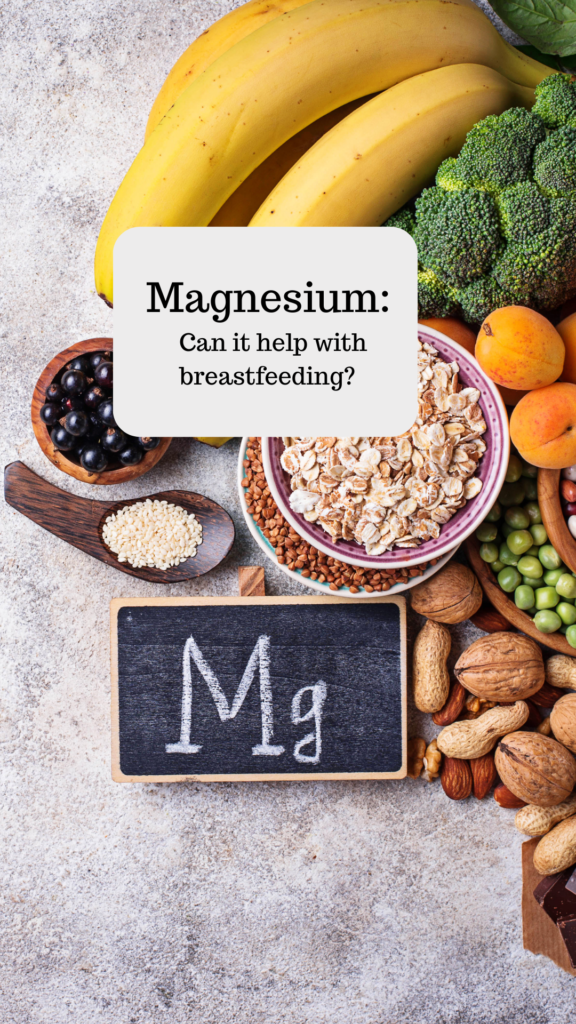Have you ever wondered if you should take magnesium supplements while breastfeeding? This is something I wondered when I was a new mom and nursed my second child for 23 months.
As a breastfeeding mom, there are so many things one can worry about and ensuring you have the right magnesium intake can easily fall to the wayside.
So, if you’re trying to figure out if you should, here are a couple of reasons why I started taking magnesium supplementation during my breastfeeding journey.
FTC DISCLOSURE: Some of the links in this post are affiliate links. If you click on them and make a purchase, I will receive a small finder’s fee on the sale.
Do prenatal vitamins contain enough magnesium?
When researching the correct vitamins to take during my pregnancy and postpartum period, I considered many brands. As a breastfeeding mother, having the correct amount of nutrients of this essential mineral. Unfortunately, there were not too many that contained the correct mg of magnesium for new mothers.
It’s always best to check the label on your prospective prenatal vitamins to check the recommended daily amount of all important vitamins and minerals.
I checked with my healthcare provider and they were ok with me taking supplements and eating foods to reach my daily requirement. I tried getting the most of my vitamins and essential nutrients through a balanced diet alone, but the postpartum period was very challenging at times.
Magnesium is a mineral that plays an important role in the body, contributing to healthy bone development, nerve function, and muscle relaxation.
When I started feeling a touch of postpartum depression paired with a diagnosis of anemia, I started taking regular supplements and using magnesium lotion to hit my recommended daily allowance of magnesium while nursing.
Does magnesium help with milk supply?
Breastfeeding is a crucial time for both the mother and the baby, and proper nutrition is essential to support the health of both. With the stress and excitement of the postpartum period, stress levels can often be higher than normal. Having a way to calm the nervous system is a good idea to help support breast milk production.
What foods are rich in magnesium?
Foods such as nuts, seeds, whole grains, and leafy greens are excellent sources of magnesium, and incorporating these foods into the diet can help ensure adequate intake. However, some women may still be at risk for magnesium deficiency even if they eat a healthy diet. Women who have had multiple pregnancies close together or who have certain medical conditions such as diabetes or gastrointestinal disorders may be at higher risk for magnesium deficiency.
In these cases, it may be appropriate for a healthcare provider to recommend magnesium supplements to ensure that both the mother and the baby are getting enough of this mineral. Additionally, some breastfeeding mothers may experience muscle cramps, which can be a sign of magnesium deficiency. In these cases, taking magnesium supplements may help relieve the symptoms.
It is important to note that excessive magnesium intake can be harmful and cause adverse effects such as diarrhea, nausea, and abdominal cramps. It is recommended that breastfeeding women consult with their healthcare provider before taking magnesium supplements to ensure they are taking a safe and appropriate dose.
What about your period and breastfeeding milk supply?
During my 23 month breastfeeding journey, I did not get my period for a long time. However, I did start noticing my milk supply starting to decrease pretty suddenly. Within a few days, I got my period. I started researching about solutions to help maintain my milk supply.
I came across a couple of solutions in one of my breastfeeding moms Facebook groups. But there was one post that had the most interactions.
Many women were suggesting taking magnesium and calcium a couple days leading up to their period and while they are on it. After a couple of days into their period, their supply would rebound.
I started taking notice of the types of nutritious foods that I was eating during the next month and taking the recommended daily amounts for postpartum moms for calcium supplement options. As far as how much magnesium to take, I followed the recommended amounts for pregnant and postpartum moms as well.
I started taking baths with magnesium salts and increasing the amount of leafy green vegetables in my diet. I prefer magnesium glycinate as it has a great oral absorption of magnesium with a minimized occurrence of side effects.
When I became very intentional of all of these things, my concern for low milk supply at the time of and leading uo to my period started to go away.
In conclusion, most breastfeeding women can get enough magnesium through their diet alone, but some may require supplements to ensure adequate intake. It is important to consult with a health care provider before taking magnesium supplements to ensure that they are taking a safe and appropriate dose.
The human body and the needs of pregnant women and a lactating mother can be overwhelming at times. However, becoming more educated on the nutritional needs, and ways of supporting it with magnesium as an essential part of a healthy diet can help even during breastfeeding and the general onset of lactation.









